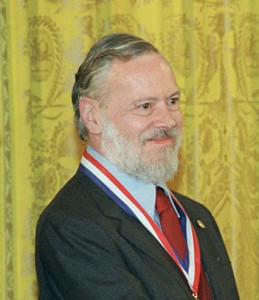I just posted a brief note about Dennis Ritchie at the Parasoft Blog. You can read about this amazing man who helped create C and Unix. Our thanks to him.
Reprinted below:

Dennis Ritchie – The creator of Unix and C
Dennis Ritchie, co-creator of the C programming language and UNIX operating system, died this week (2011). Back in the early days of Parasoft, we used to refer to “C” as “K&R C” (for “Kernighan and Ritchie C”). In fact, like lots of other long-time C programmers, many Parasoft veterans still have the classic C Programming Language book sitting on their bookshelves today.
Although he’s hardly a household name, Ritchie has had a tremendous influence on the software development community. Where might we be today if we didn’t have the luxury of building on his foundations?
On the language side, consider all the languages that were derived from C. Without C, there’s no C++…without which there’s no Java, no C#, and no Objective C. An enourmous amount of the software that we use everyday was built on those languages.
And on the OS side, think of all the things that stemmed from UNIX. Without UNIX, there’s no Linux. No Mac OS X. No Solaris. And without Linux, where would the open source community be? Would we have Android? What would the mobile device market look like? The server market?
In many ways, his vision was eerily similar to that of Steve Jobs: have it do what you really need it to do… and no more. It’s the epitome of elegant engineering.
If you compare C to Java, one of the defining differences is that Java is a very rich language. It has a built-in library that will cover pretty much anything you can think of. C has none of this—but it’s fantastically fast. It takes a lot less code to do something in C than it does in Java, VB, C# and the like. That’s really why C is still so popular. It’s a great balance between being close to the computer (and thus efficient) and being human understandable. The newer languages are more human understandable, but the trade off is that they’re rather inefficient compared to C.
The UNIX kernel is the same way. Amazingly, Thompson and Ritchie’s UNIX kernel was only 64K—smaller than the current Linux keyboard driver! UNIX truly respects the concept of having layers in an operating system. At the core, there’s just a kernel that runs the computer. Services lay on top of that. Networking is separate. Hard drives are an add-on (not core to the OS). And the GUI is a very high-level layer. This separation enables extreme efficiency. For example, while moving Windows to a new chip tends to open a can of worms, it’s actually quite simple with UNIX.
A few remarkable quips from Ritchie:
“I am not now, nor have I ever been, a member of the demigodic party.”
“UNIX is very simple, it just needs a genius to understand its simplicity.”
“C is quirky, flawed, and an enormous success.”
As Jon “Maddog” Hall, executive director of Linux International, tweeted: “…all programmers owe him a moment of silence.”
For a nice tribute to Ritchie, see the special Dr. Dobb’s newsletter.
